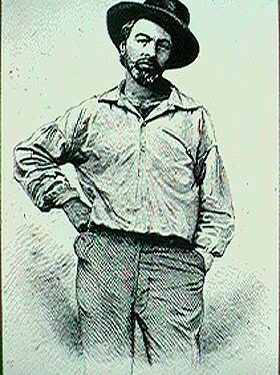What is the short summary of Song of Myself
Song of Myself Summary by Walt Whitman,What is the concept of I in Song of Myself?,What is the first line of Song of Myself?, What is the theme of mysticism in Song of Myself?, What is the tone of the Song of Myself?, Who is the speaker in the poem Song of Myself?,Walt Whitman’s Song of Myself is a seminal piece of American poetry that was first published in 1855 as a part of his collection “Leaves of Grass.” “Song of Myself” is a key work in Whitman’s poetic legacy as well as the larger literary canon. It is a vivid examination of the interconnection of all living things, a celebration of the individual, and a paean to democracy. Walt Whitman, who is sometimes referred to as the “Bard of Democracy,” wrote in a revolutionary free-verse style that disregarded conventional poetic conventions and allowed the poem to have a flowing, organic cadence.
Whitman takes readers on a profoundly personal journey through poetry, touching on topics such as identity, democracy, nature, sexuality, and the spiritual aspects of life. Whitman’s transcendentalist views are reflected in the poem, which highlights the fundamental goodness of people and the close relationship that exists between them and the universe.
When we read through the verses of “Song of Myself,” we come across Whitman’s broad perspective on America, his appreciation of variety, and his profound insights on death, life, and the never-ending cycle of existence. The poem’s timeless significance comes from its capacity to evoke reflection in readers from all backgrounds and eras.
Song of myself by walt whitman summary
line 6-24: Whitman describes various aspects of the self, both physical and metaphysical. He embraces the diversity of human experience, celebrating the body, the soul, and the multitude of identities that make up the whole. He also reflects on the cycle of life, death, and rebirth.
line 25-52: The poet explores the theme of democracy, envisioning a society where every individual is valued and respected. He emphasizes the importance of equality, justice, and the interconnectedness of all people. Whitman expresses a deep connection with nature and the spiritual dimension of existence.
line 53-77: Whitman reflects on the human experience, addressing themes of sexuality, love, and the transcendence of the physical body. He presents a vision of unity, where all individuals, regardless of their differences, contribute to the harmonious whole.What is the short summary of Song of Myself
line 78-83: The poet shifts to a more personal and introspective tone, contemplating his own existence and mortality. He acknowledges the inevitable cycle of life and death, expressing a sense of peace and acceptance.
line 84-90: Whitman concludes the poem by summarizing its central themes. He encourages readers to embrace their individuality, celebrate the diversity of life, and recognize the interconnectedness of all living things. The poem ends with an affirmation of the eternal nature of the self and the universe.
Song of Myself poem
Also Read-
- The income tax man poem line by line summary
- If Poem By Rudyard Kipling Poem Summary Line by Line
- I cannot live without you poem summary line by line
Conclusion
Song of Myself by Walt Whitman stands as a monumental work in American poetry, embodying the spirit of individualism, democracy, and the celebration of the human experience. Through its free-verse style and expansive themes, Whitman invites readers to embark on a journey of self-discovery, embracing the diversity of existence and recognizing the interconnectedness of all living things.What is the concept of I in Song of Myself?,What is the first line of Song of Myself?, What is the theme of mysticism in Song of Myself?, What is the tone of the Song of Myself?, Who is the speaker in the poem Song of Myself?,
The poem is a testament to Whitman’s belief in the inherent goodness of humanity, his celebration of diversity, and his vision of a democratic society where every individual is valued. The expansive and inclusive nature of “Song of Myself” has made it a timeless and influential piece of literature that continues to resonate with readers around the world.What is the short summary of Song of Myself
FAQ:
1. What is the main theme of “Song of Myself”?
The main theme of “Song of Myself” is the celebration of the self, individualism, and the interconnectedness of all living things. Walt Whitman explores the diverse facets of human experience, envisions a democratic and egalitarian society, and emphasizes the oneness of the self with the universe.
2. How does Whitman express the idea of democracy in the poem?
Whitman expresses the idea of democracy in “Song of Myself” by envisioning a society where every individual, regardless of background or status, is valued and respected. He celebrates the diversity of people and suggests that each person contributes to the harmonious whole of a democratic and egalitarian community.
3. What is the role of nature in “Song of Myself”?
Nature plays a significant role in the poem as Whitman draws inspiration from the natural world to illustrate the interconnectedness of all life. He uses nature as a metaphor for the diverse experiences of individuals and emphasizes the spiritual and transcendental aspects of existence.
4. How does Whitman address the themes of sexuality and love in the poem?
Whitman approaches themes of sexuality and love with a frank and celebratory tone. He expresses a deep appreciation for the physical aspects of human experience, treating love and sexuality as natural and integral components of life. This contributes to the overall theme of embracing the entirety of the human experience.
5. How does “Song of Myself” reflect transcendentalist ideals?
“Song of Myself” reflects transcendentalist ideals by emphasizing the inherent goodness of humanity, the spiritual connection between individuals and nature, and the celebration of the self as a divine and essential part of the universe. Whitman’s poetry aligns with the transcendentalist belief in the innate goodness of people and the interconnectedness of all life.
















